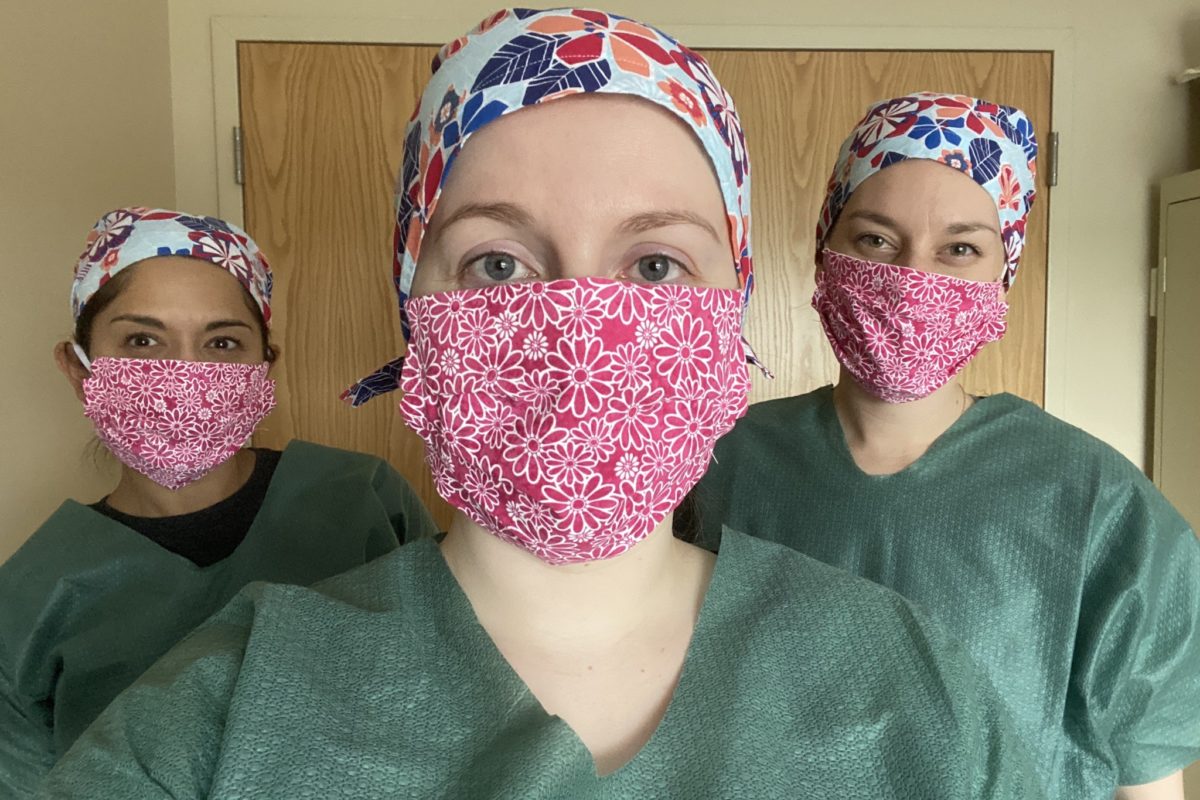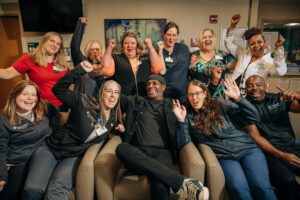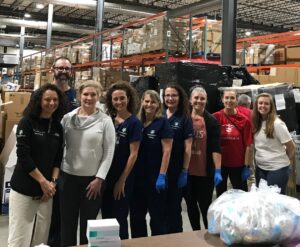We are shining a light on these #healthcareheroes in this Q&A with Rehabilitation Services caregivers.
During the coronavirus pandemic, Rehabilitation Services caregivers have doubled down on working with patients to regain and retain strength, flexibility and mobility.
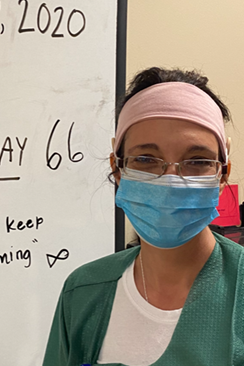
They have focused on hospital inpatients — especially those experiencing long stays in ChristianaCare hospitals because they are not yet ready to go home or gain admission to skilled nursing facilities due to restrictions on movement.
“In this stressful environment, these team members have proven themselves to be dedicated professionals, providing outstanding care to our patients and demonstrating the ChristianaCare values of love and excellence,” said Julie Marsh, PT, MPT, program manager at Wilmington Hospital.
“We have been seeing many inpatients with an increased frequency in order to help them improve as quickly as possible,” Marsh said. “The hope is that we can actually help them get home instead of entering a rehabilitation facility, and thus facilitate the availability of hospital resources for incoming patients. And we have really made a difference, with many patients actually becoming strong enough to be discharged to home with family support.”
What inspires you to be a caregiver?
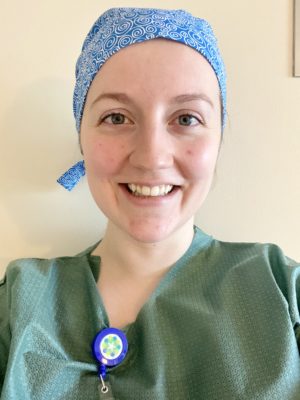
Kasey Feggins, Physical Therapist: Every morning when I get up for work, I remind myself how much of an impact the care I am providing is making. The patients on COVID-19 units have not seen their loved ones for long periods of time and are now only communicating face to face with strangers in masks and gowns. I make it my goal to be sure the patient is comfortable by asking if they have any needs before I leave their room. I get to know my patients and their interests to create a stronger relationship with them. I also make sure I identify and introduce myself with each visit, as it is hard for patients to recognize faces when we have personal protective equipment (PPE) donned.
Maria Collins, Physical Therapy Assistant: I have always wanted to work in a field where I could help people. Even before the virus, we see patients at their most vulnerable state, and knowing that I can help them feel better and make an impact on their recovery inspires me. During this difficult time, it means so much that I can be there for my patients when their families cannot due to limiting visitors to protect everyone.
Maggie Short, Rehabilitation Aide: Being a caregiver is all about putting away your needs to assist others. I have always wanted to help others and do my best to bring a smile to their face in their time of need. I enjoy the moments that I can reflect back and see how I have helped someone and that is what inspires me every day.
Frank Austin, Physical Therapist
Helping people overcome a difficult hurdle of recovering from an illness, maximizing function and returning patients to their families to live as complete and satisfying life as possible.
How has your typical workday changed? What work are you doing differently because of COVID-19?
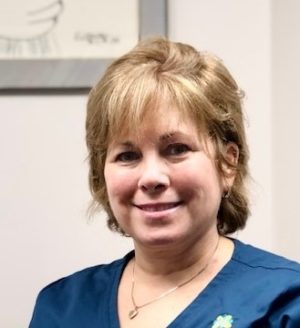
Rebecca Brockson, Physical Therapy Program Manager: In the beginning of the pandemic, I put significant effort into intensely training the team in proper PPE use and also into cross training the team members in anticipation of the possibility of having to cover patients across service lines.
I really believe that being available to my team to provide support to promptly and accurately answer questions, to be a role model in working and treating some patients on the COVID floors, and to provide information on the evidence base which supports some of our PPE protocols have helped our team stay calm in this crisis.
Feggins: In order to conserve PPE, we do our best to assist our coworkers with tasks such as making patient’s beds, cleaning floors and retrieving snacks or drinks for patients in addition to our typical work as physical therapists.
Austin: Covid affects clients physically and emotionally. It challenges a patient’s will. I find myself addressing more of the emotional side of clients to keep them from quitting, to address their loneliness, to make them believe they will recover.
What is keeping you motivated during these uncertain times?
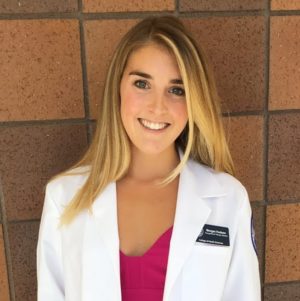
Morgan Hudson, Occupational Therapist: I am motivated by helping these patients through a difficult and uncertain time in their life, especially when they do not have a family member at their bedside to be their support system. It is important to be a supportive and positive influence for these patient’s to instill hope and visualize recovery.
Collins: I am passionate about working with my patients. Being the best caregiver I can be, helping my patients reach their personal goals motivates me. It is more than just physical therapy. It’s getting to know them personally, lifting their spirits, and helping them navigate their hospital stay and rehab process.
My rehab team, family, and community have especially inspired me during this uncertain time. It is very uplifting to see the community come together to support one another and appreciate what each person can do to flatten the curve.
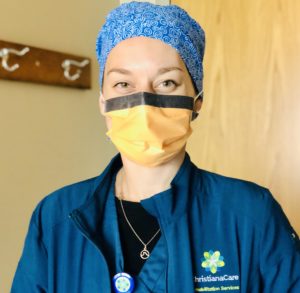
Short: During these uncertain times my family, coworkers and being able to help our patients get well keeps me motivated. I have many immuno-compromised family members so unfortunately, I have not been able to see them physically. I hope to see them again soon and hug them help me get through this difficult time. I lean on my fellow coworkers for their positive support, especially on the harder days.
Being able to see the gratitude from patients and the success stories of patients going home is one of the most rewarding aspects of our job. We have been able to personally cheer them on while they are leaving the hospital and that is what motivates me to get up and come to work every morning.
Brockson: In the beginning of this crisis, we were all kind of afraid and stressed, but what I said to my team is what I really believe: I think we all went into health care in order to be able to help people and to make a difference. A pandemic like this is our opportunity to make a difference and to “walk the walk” (no PT pun intended!) to demonstrate the great things that the PT team does every day here at ChristianaCare.
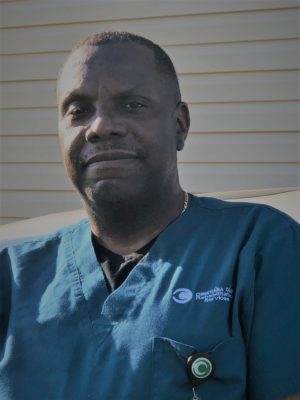
Austin: The challenge of not allowing the patient to quit and believing that this difficult time will pass keeps me motivated.
What advice do you have for your fellow caregivers?
Marsh: I think it’s true that laughter is the best medicine. I’m finding that humor is what is helping me get through the uncertainty and long days. The memes I’m seeing are hilarious so I’m passing along to colleagues and even some patients to try to brighten their day.

Collins: My advice for my fellow caregivers and community would be to take each day, one day at a time. It is difficult to think of the uncertainty of the future; however now, more than ever, we need to rely on each other’s strength to get through each day. I think it is important to keep an open communication line with family, friends, and fellow caregivers. We cannot be afraid to ask for any kind of help.
Hudson: Be kind to each other and remember we are all dealing with this stressful time in different ways. Patience goes a long way!
Austin: I tell caregivers it is OK to be afraid of exposure to this virus. Respect the virus and take the necessary precautions. If we work together everything will be all right.
What advice do you have for our community?
Feggins: Although it is hard to stray from our usual daily lives, the only way to safely return to them in the future is to now abide by social distancing guidelines. This even includes family gatherings with those you do not live with, as we have seen a high number of families being admitted together for hospital care.
Short: Be hopeful and faithful. Know that as caregivers we are on the front lines working to care for your loved ones during this difficult time. We show up to work every day ready and willing to care for anyone, and it is important that as a community we make sure to follow the guidelines and social distance. We all must work together so that we can see our loved ones and hug them a little tighter once again.
Brockson: Hang in there, this will get better. Acknowledge the everyday joys that bring you happiness, focus on the positives that do occur every day, whether it is spending more quality time with your family, being able to enjoy the outdoors, or knowing that we are all in this together.
Austin: I tell the community to be adhere to proper hygiene and social distancing. Don’t think it can’t happen to you.
